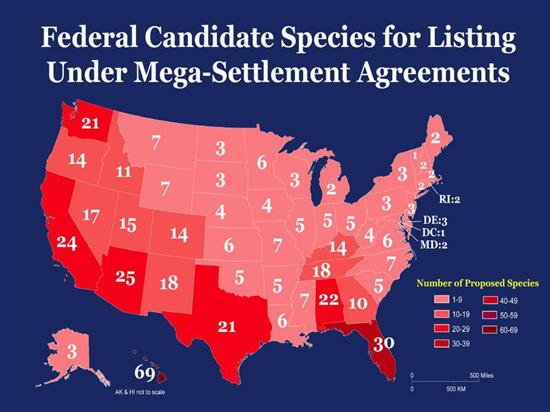Floor Statements
Chairman Hastings Floor Statement on Legislation to Improve & Update the Endangered Species ActBill would help make the law more effective for both species and people
WASHINGTON, D.C.,
July 29, 2014
|
Committee Press Office
(202-225-2761)
Tags:
Endangered Species
Today, House Natural Resources Committee Chairman Doc Hastings (WA-04) delivered the flooring floor statement in support of H.R. 4315, the Endangered Species Transparency and Reasonableness Act.
“Mr. Chairman, today, I’m pleased to bring before the House legislation that would help update and improve the Endangered Species Act—a law over 40-years old that was last reauthorized in 1988. H.R. 4315 melds together four common sense and focused bills introduced earlier this year by myself, Representatives Lummis, Neugebauer and Huizenga. While respecting the original intent of the ESA to conserve species, this bill would help make the law more effective for both species and people. Because of the more than 500 ESA-related lawsuits that have been filed against the government during this Administration alone, it has become clear that costly litigation is not only driving ESA priorities, but litigation has become an impediment to species recovery. I should also note that regardless of what some groups are saying, this is not a comprehensive bill – its four sections aim to increase transparency, to enlist greater consultation by states, localities and tribes and to reduce taxpayer-financed attorneys fees to help invest more funding in actual species recovery. For example, Section 2 of the bill requires data used by federal agencies that decides which species should be added to the threatened or endangered list, to be publicly available and accessible through the Internet. The last significant update to the ESA was when the Internet was in its infant stages. Posting data supporting key ESA decisions online will greatly enhance transparency and data quality. The American people should be able to access such data before federal listing and de-listing decisions are final. It is troubling that hundreds of sweeping listing decisions by the Fish and Wildlife Service and the National Marine Fisheries Service cite unpublished studies, professional opinions, and other sources that are inaccessible to the public yet this data would be used to regulate the very people who don’t have access to this information. This secrecy goes against the grain of good science and transparency. Data transparency is not only good for the American public in that it makes our government more accountable, it is also good for species because it allows for an open conversation about improving species science. As biologist Rob Roy Ramey testified, at a Natural Resources Committee hearing; “When the data are not publicly accessible, legitimate scientific inquiry and debate is effectively eliminated, and no independent third party can produce the results. This action puts the basis of some ESA decisions outside the realm of science and species recovery is no better off. Withholding data does not further the goal of species recovery.” I couldn’t agree more, especially when over 700 species could potentially be listed over the next few years throughout the country. These potential listings are due to this Administration’s mega-lawsuit settlement with the Center for Biological Diversity and WildEarth Guardians—groups that have filed hundreds of lawsuits against the government at taxpayer expense.
One of these species could include the northern long-eared bat. It’s a listing which could impact 39 states. Information on data when it comes to these species can only help, not hurt. This bill fosters release of this information. Section 3 of the bill would enhance state, local and tribal involvement in ESA decisions, by requiring that before any listing decision is made, the federal government must disclose its data to states affected by such actions. In addition, Section 3 ensures that data from local, state and tribal entities - those closest to the ground - be factored into ESA listing decisions. Section 4 would require the Administration to track and make available online the costs, in time and resources, to taxpayers as a result of ESA-related litigation. Finally, section 5 would seek to reduce taxpayer-financed attorneys fees to help ensure that federal resources are focused more on species protection and recovery than on lucrative legal fees for serial litigants. Such fees now are awarded as high as $600/hour. This provision puts in place the same reasonable hourly caps on attorney fees used in another federal law, the Equal Access to Justice Act, for veterans, Social Security disability and other such claims. H.R. 4315 starts with modest, sensible updates to the ESA by promoting transparency, greater state, local and tribal involvement, and bringing ESA litigation fees in line with another federal law.” |
Newsletter Sign Up
Sign up to receive news, updates and insights directly to your inbox.

